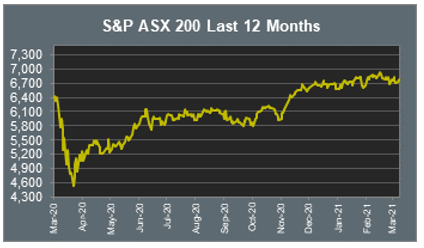Morning Market Update - 10 March 2021

Cutcher & Neale
09 March 2021
17 July 2023
minutes
Pre-Open Data

Key Data for the Week
- Tuesday – AUS – NAB Business Confidence & Conditions – Business Confidence increased to 16 in February, from 10 in January, its highest level since early 2010. Business Conditions rose to 15 in February, from 7 in January.
- Tuesday – EUR – Gross Domestic Product contracted 0.7% in the December quarter. GDP was down 4.9% annually.
- Wednesday – CHINA – Consumer Price Index
- Wednesday – US – Consumer Price Index

Australian Market
The Australian sharemarket lifted 0.5% yesterday in a mixed session of trade. Utilities and Industrials were among the best performing sectors, each up over 1.0%, while Energy lost 0.5% and Information Technology shed 1.7%.
The Financials sector rose 1.0% as all major banks closed higher. ANZ led the gains, up 1.3% and NAB rose 0.8%, while Commonwealth Bank and Westpac both added 0.7%. Insurers were mixed; QBE Insurance Group lifted 3.8% and NIB gained 0.5%, while IAG gave up 4.0% following concerns the insurer would suffer losses from the collapse of supply chain provider Greensill Capital. However, during a halt to trading, the company announced it had no insurance exposure to the Greensill companies.
The Information Technology sector extended losses, weighed down by buy-now-pay-later providers. Afterpay and Sezzle both lost 3.6%, while Zip Co gave up 1.6%. Accounting software provider Xero shed 3.8%, however, artificial intelligence company Appen bucked the trend to gain 5.0%.
The Australian futures market points to a 0.26% rise today, driven by stronger overseas markets.
Overseas Markets
European sharemarkets advanced on Tuesday as gains from the Utilities and Energy sectors helped offset losses in the Materials sector. British mining company Anglo American lost 4.1%, while the UK listed Rio Tinto and BHP fell 3.7% and 2.4% respectively. The Financials sector also saw losses; Barclays lost 1.2% and Lloyds Bank slipped 1.5%, while HSBC fell 1.8%. By the close of trade, the STOXX Europe 600 lifted 0.8% and the German DAX rose 0.4%, while the UK FTSE 100 added 0.2%.
US sharemarkets rallied overnight as US bond yields declined. The Information Technology sector reversed recent losses to jump 3.4%; NVIDIA climbed 8.0% and Spotify lifted 5.9%, while Facebook and Apple both gained 4.1%. Renewable energy stocks also enjoyed strong gains; SolarEdge Technologies surged 13.5% and Enphase Energy climbed 12.6%, while electric vehicle infrastructure company ChargePoint lifted 10.9%. The Financials sector slipped 0.9% despite improvements in financial services; PayPal jumped 6.9% and PagSeguro lifted 4.3%, while MasterCard rose 1.4%.
By the close of trade, the NASDAQ rallied 3.7% and the S&P 500 gained 1.4%, while the Dow Jones lifted 0.1%.
CNIS Perspective
Over the weekend we saw a third round of stimulus cheques, known as the Biden administration’s ‘American Rescue Plan’, be approved by the Senate and looks likely to pass the House of Representatives tonight, after which it would head to the White House for Biden’s signature.
At US$1,400 per individual, plus additional benefits to those with dependents, this will be the largest stimulus cheque received by most Americans during the pandemic. Comparatively, the first round saw recipients receive US$1,200, and the second, US$600.
However, a recent Deutsche Bank survey provides an insight into how much cash from US stimulus payments may find its way into the equity market, rather than its intended use of boosting consumer spending and economic growth.
Surprisingly, the results showed that those recipients surveyed plan to spend on average 37% of any forthcoming stimulus directly on stocks. More notably, those aged between 25-34 plan to spend on average 50% of their stimulus payments on purchasing shares.
While this may be seen as a positive for sharemarkets, with inflows expected to be seen in coming months, it begs the question of whether the latest round of stimulus is required, or at the very least, distributed to where it is needed most to boost the US economy.
Should you wish to discuss this or any other investment related matter, please contact your Investment Services Team on (02) 4928 8500.
Disclaimer
The material contained in this publication is the nature of the general comment only, and neither purports, nor is intended to be advice on any particular matter. Persons should not act nor rely upon any information contained in or implied by this publication without seeking appropriate professional advice which relates specifically to his/her particular circumstances. Cutcher & Neale Investment Services Pty Limited expressly disclaim all and any liability to any person, whether a client of Cutcher & Neale Investment Services Pty Limited or not, who acts or fails to act as a consequence of reliance upon the whole or any part of this publication.
Cutcher & Neale Investment Services Pty Limited ABN 38 107 536 783 is a Corporate Authorised Representative of Cutcher & Neale Financial Services Pty Ltd ABN 22 160 682 879 AFSL 433814.

